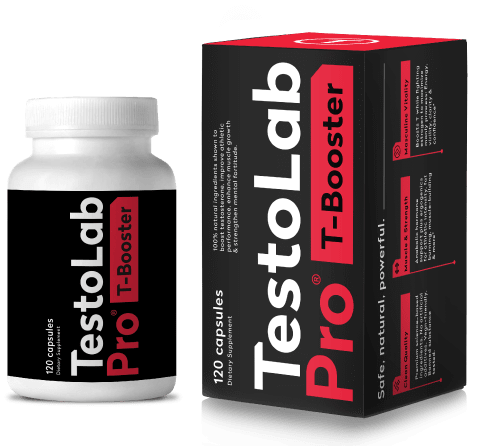Building muscle is no easy feat. Some would say it’s just as difficult and gruelling as losing weight. While some would disagree, it is definitely a long process!
There are many factors to consider when gaining muscle—nutrition, training, sleep, hydration, and testosterone.
You’re probably wondering what role testosterone plays in muscle building. Put it this way, without testosterone, it would be near-enough impossible to gain muscle mass.
For men particularly, testosterone is often overlooked when it comes to gaining muscle. Failing to practice nutrition and lifestyle strategies that not only focus on muscle building, but also testosterone levels, can make the difference between gaining and maintaining!
Some would even say muscle building and testosterone levels go hand in hand. So, is it possible to gain muscle even with low testosterone levels?
Is low testosterone enough to build muscle? How can you boost your testosterone to optimize your muscle gains?
All will be discussed in this short guide to testosterone and muscle building!
Testosterone 101
Firstly, a brief lesson on the role of testosterone!
Testosterone is the “male hormone” produced in the testes and is responsible for all things masculine. Testosterone is the hormone connected to sexual development, muscle building, body weight, the brain and cognition, and hair loss.
Testosterone is often divided into three categories: tightly bound testosterone, loosely bound testosterone, and free testosterone.
Your loosely bound and free testosterone are the two groups that make up your bioavailable testosterone, which is what has the largest impact on health.
It’s crucial for health and wellbeing, particularly males, that testosterone levels are maintained within a healthy range.
Factors such as poor sleep, lack of quality food intake, a sedentary lifestyle, and poor weight management can all have a negative impact on testosterone levels.
If you have abnormally low testosterone levels, you may experience symptoms such as:
- Depression
- Erectile dysfunction
- Hair loss
- Increased body fat
- Fertility issues
- Loss of muscle mass
- Low libido
- Low sperm count
Though, a poor diet and lifestyle are not the only culprits to low testosterone levels. Medication, medical conditions, and age are also factors that can affect testosterone levels, which often require more specific medical attention.
Regardless of the factors causing low testosterone levels, it can still have a huge negative blow on your muscle gains!
Testosterone and Muscle Building
Testosterone is an anabolic hormone. Anabolic metabolism (anabolism) essentially means building new compounds and tissues, including muscle. The body uses protein and amino acids like building blocks, which uses up energy in the process.
Regarding bodybuilding, anabolism means to increase and strengthen muscle mass and bones. Hormones such as testosterone, estrogen, growth hormone, IGF1, and insulin are all considered anabolic hormones.
Testosterone also plays a significant role in muscle protein synthesis, which is the process of repairing and rebuilding muscle after exercise. Muscle protein synthesis is quite simply the driving force behind adaptive responses to intense training.
There are many ways to trigger this process, such as consuming enough protein (with a good leucine content), physical activity, and adequate testosterone levels.
So, is it actually possible to build muscle with low T?
Can You Build Muscle with Low Testosterone?
While it would be very challenging to build muscle with low T, it is definitely not impossible.
In fact, incorporating more strength training into your workout routine would help boost testosterone levels.
There are also other ways in which you can maximize muscle gains if you have low testosterone levels. The following tips would help reverse your low testosterone and all the symptoms that come with it!
- Incorporate cardio into your workout routine
Cardio training actually helps increase human growth hormone (HGH), which plays a key role in muscle building. Scheduling some short blasts of cardio into your training routine would be a good idea!
- Focus heavily on weight training
Following on from training strategies, weight training is king. Not only is this the fundamental factor in growing muscle, but the more muscle mass you have, the higher your testosterone levels.
- Pre- and post-workout nutrition is key
Consuming enough protein and carbohydrates pre and post workout will ensure you are fueling and recovering to your optimal potential. These macronutrients are key for muscle building (and muscle protein synthesis!), and without them, your sessions would be subpar along with your muscle gains.
- Prioritize rest and recovery
Although pushing your limits during a workout is necessary, so is rest and recovery. Working too hard can actually be counterproductive to your gains, so ensure you are giving your body adequate rest in between workouts and getting some good quality sleep each night!
- Consume testosterone-boosting nutrients
Eating plenty of foods rich in magnesium, vitamin D, zinc, and protein—all essential nutrients for testosterone levels and muscle gains!
Some sources of these nutrients include oily fish, eggs, red meat, nuts and seeds, and leafy greens.
Dialling in the above tips would not only help boost testosterone, but they would also help maintain a healthy body weight, increase muscle mass, and increase strength, which all play a role in maintaining testosterone levels and the ability to gain muscle!
Take-Home Message
Building muscle is a challenge in itself, but even more so with low testosterone levels.
Though, it is not impossible! There are a number of strategies that you can implement into your diet and lifestyle which can help boost testosterone levels and maximize muscle gains.
Additionally, opting for a natural testosterone booster such as Testo Lab Pro could also be beneficial to your T-boosting muscle gains!

